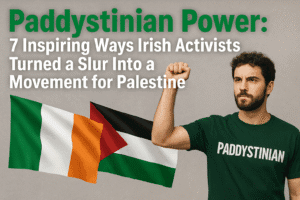Paddystinian Power: 7 Inspiring Ways Irish Activists Turned a Slur Into a Movement for Palestine
Irish activists have powerfully reclaimed the slur “Paddystinian,” turning it into a bold symbol of solidarity with Palestine. Originally coined to mock Ireland’s support for Palestinian rights, the term now represents unity, cultural pride, and resistance. Embraced across social media and activism, “Paddystinian” is featured on merchandise that supports aid efforts in Gaza and sparks global awareness. This transformation echoes Ireland’s own anti-colonial history and deep-rooted empathy for Palestinian struggles.
Influential voices like musicians, café owners, and digital creators have driven the movement forward, using humor and art to dismantle stereotypes. Activists are now pushing for concrete policy changes, including divestment from Israeli settlements and restrictions on military transit. Their aim: to ensure that symbolic support becomes political action. The “Paddystinian” movement exemplifies how marginalized communities can reshape narratives, bridge global causes, and transform insult into empowerment.

Paddystinian Power: 7 Inspiring Ways Irish Activists Turned a Slur Into a Movement for Palestine
In a striking example of turning division into unity, Irish pro-Palestine activists have transformed the term “Paddystinian”—once wielded as a derogatory jab—into a rallying cry for solidarity. What began as an attempt to mock Ireland’s vocal support for Palestine has instead galvanized a movement, blending cultural pride with global activism.
The Origins: A Slur Meant to Divide
The term “Paddystinian” first surfaced in late 2023, reportedly coined by pro-Israel commentators to criticize Ireland’s unwavering stance on Palestinian rights. The word merges “Paddy,” a historic slur stereotyping Irish people as rowdy or backward, with “Palestinian,” implying Ireland’s solidarity was misguided or extremist. But rather than shying away, Irish activists seized the term with defiant pride.
“It’s classic Irish resilience,” says Ross McGann, a TikTok creator with a sizable following. “We’ve always taken insults and made them our own. When I heard ‘Paddystinian,’ I thought, this is our chance to flip the script.”
Reclaiming Identity: Merchandise, Memes, and Mobilization
The rebranding of “Paddystinian” has been both creative and impactful. Social media bios now flaunt the label, while TikTok videos pair it with calls to action for Gaza. Merchandise—T-shirts, pins, and hoodies—has turned the term into wearable activism. Proceeds often fund aid organizations like Medical Aid for Palestinians.
Cork’s Izz Cafe, a Palestinian-owned eatery, sells “Paddystinian” pins, with owner Izzeddeen Alkarajeh noting, “It’s a beautiful reclamation. What was meant to divide now unites us.” Even the Palestinian ambassador to Ireland, Jilan Wahba Abdalmajid, endorsed the linkage, highlighting shared histories of resistance against colonization.
A Legacy of Solidarity Rooted in History
Ireland’s bond with Palestine isn’t new. For decades, parallels have been drawn between Ireland’s struggle for independence from British rule and Palestine’s ongoing fight against occupation. This historical empathy fuels grassroots campaigns today, from boycotts of Israeli settlement goods to protests over Ireland’s role in facilitating military transit.
Zoë Lawlor of the Ireland Palestine Solidarity Campaign emphasizes, “Our government’s rhetoric is strong, but we need action—like banning trade with illegal settlements.” Activists aim to leverage Ireland’s EU influence to push for broader policy shifts, such as sanctions on Israel.
Cultural Power: Kneecap, Humor, and Digital Activism
The movement’s momentum is amplified by cultural icons like rap group Kneecap, whose pro-Palestine lyrics and legal battles (one member faces terrorism charges for a controversial TikTok post) spotlight Ireland’s activist spirit. Their planned Glastonbury performance—now under scrutiny—underscores how art and politics collide in this debate.
Meanwhile, humor remains a tool for subversion. Social media brims with memes juxtaposing Irish and Palestinian flags or reworking stereotypes. As McGann notes, “Laughter disarms. When we own the joke, we take away its sting.”
The Road Ahead: From Hashtags to Policy Change
While “Paddystinian” thrives online, activists stress that symbolism must translate into tangible change. Key demands include:
- Enacting the Illegal Israeli Settlements Divestment Bill to block economic ties with occupied territories.
- Halting Irish airspace use for flights suspected of transporting military supplies to Israel.
- Pressuring the EU to adopt a tougher stance on Gaza’s humanitarian crisis.
Why This Matters Beyond Ireland
The “Paddystinian” phenomenon reflects a broader truth: marginalized communities globally are rewriting narratives through digital activism. Just as Black Lives Matter reclaimed systemic racism discourse or LGBTQ+ groups repurposed slurs, Ireland’s solidarity model shows how collective identity can fuel transnational movements.
As Lawlor puts it, “Solidarity isn’t just a slogan. It’s about using every tool—even a hashtag—to demand justice.” In a world where disinformation and division dominate, the story of “Paddystinian” offers a blueprint for turning scorn into strength.
The reclamation of “Paddystinian” isn’t just a linguistic victory—it’s a testament to how empathy, history, and humor can forge unbreakable bonds between peoples oceans apart. In Ireland’s case, the past’s struggles have become the present’s purpose.
You must be logged in to post a comment.